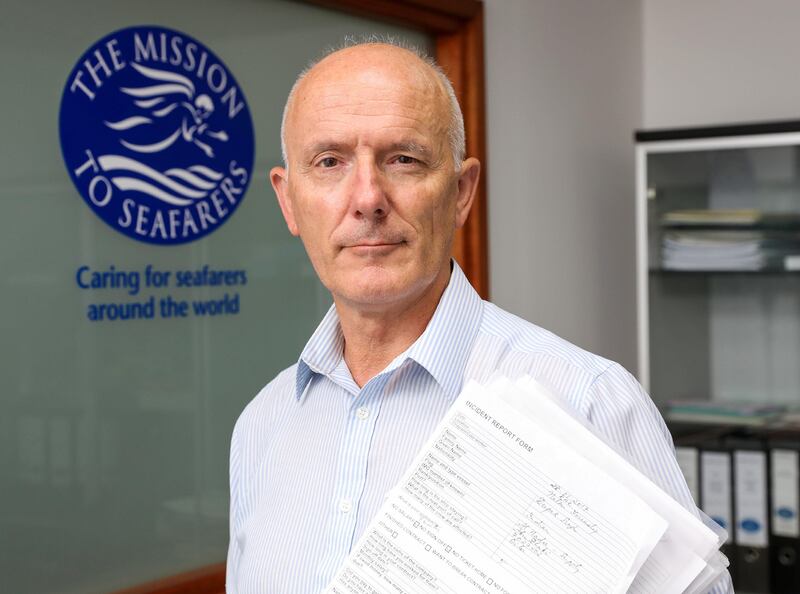Sailors are going months without being paid wages as ships are increasingly being abandoned off the UAE’s shores, a top transport official said.
Despite erring owners being warned by the Federal Transport Authority, the number of sailors being stranded without food, water and fuel has increased over the past year.
The FTA said it is currently dealing with 14 abandoned ships and about 50 unpaid sailors.
This is apart from 15 cases of ships being abandoned and 100 sailors with outstanding salaries the Authority worked to resolve with consulate officials and aid workers.
Low oil prices and shipping companies in financial trouble have directly impacted the number of ships stranded off the country’s coast.
“We have noticed from the last six months an increase of abandoned ship cases in UAE waters and ports, especially in the offshore supply vessels sector which has been affected negatively with the low oil price, where oil companies are delaying or cancelling some of their expansion agreements,” said Abdulla Al Kathiri, general manager at the Federal Transport Authority.
_______________
Read more:
[ Sailors forced to live off condensation from ac units as wages go unpaid, charity says ]
[ Drop in oil prices leads to increase in abandoned ships off UAE shore ]
“We have solved the issues of around 15 ships with more than 100 seafarers who have been paid and repatriated, currently we are dealing with 14 small ships and 50 seafarers on board.”
Strict action will be taken in case of recurrence of offences, the authority warned.
In a strongly worded warning to ship owners and agents who repeatedly abandon vessels in UAE waters, Mr Al Kathiri said, “The UAE maritime law is very strict when it comes to issues related to the crew wages, and if the owner fails to fulfil his obligation toward his crew, his ship can be arrested by the court and sold in the auction to pay the crew wages. An owner repeating such offensives will be black listed in the UAE and will not be allowed to operate again in UAE waters.”
To streamline the process and weed out companies with a poor track record, there are plans to route operating licences through one federal authority instead of via local authorities in different emirates.
“As this stage those companies are getting their licenses from local authorities in the UAE, we are working now to ensure there will be no maritime activities licensed in the UAE without getting a no-objection from the FTA, where we can control the licensing process of the maritime companies,” he said.
Although, the FTA has the authority to arrest the ship and black list its owner and agents, negotiation is the path it usually follows.
In recent months, the Authority has worked with the Indian consulate and other overseas missions such as that of the Philippines and Sri Lanka to enable sailors to return home with wages.
Indian consul general Vipul, who uses one name, and his team worked with the FTA to repatriate about 90 sailors over the past two months.
At least six ships remain with about 35 Indian crew members who have not been paid for between nine to 17 months.
“There are still some ships in extremely distressed conditions where the working conditions are bad and Indian sailors are stuck with pending salaries. Sailors are ill on some ships and it’s very difficult to resolve some cases because agents and owners use all kinds of means to abandon their responsibility,” said Mr Vipul.
“We are also looking at legal options but those are time consuming so we are still working with the FTA to see how we can help these seafarers expeditiously.”
Explaining the FTA’s response, Mr Al Kathiri said although the authority could cancel the licence and ban the ship from UAE waters, this would impede payments to sailors.
“However this an option we have and we can use when we don’t see any cooperation from the owner,” he said.
Citing an instance when after negotiations, an owner sold a ship to pay the crew’s wages, he said, “The main concern for us is to solve the seafarer’s dilemma and ensure they are repatriated back to their country safely. If the owner is facing financial difficulty or is in prison as in some cases, fines will not solve the problems of the crew.
Cancelling owners’ licences will worsen their situation and will not solve the seafarers’ issues. The most important thing is to work with owners to solve the problem, and we have managed in this way to solve many cases.”
Aside from the official numbers, relief workers said the numbers of sailors with unpaid wages ran into hundreds since crew radio for help only when there is no other recourse.
Paul Burt, regional director, Gulf and South Asia, of welfare group Mission to Seafarers too detected the rising trend of abandonment.
“We go out into the anchorages when there is a specific need, where a crew has no food or water,” he said.
“Each time we go out we deliver to three-four ships. We do this maybe once a year, but this year and last year the frequency is rising. So far this year we have done five-six such trips and with the cases we are meeting, we would expect to make another two-three trips by the end of the year. That’s a major indication that the difficulties are increasing.”
Welcoming the FTA’s warning to owners to settle dues, he said, it was a “constructive and clear demonstration of the UAE authorities’ determination to stamp out sub-standard maritime activity in local waters.”







